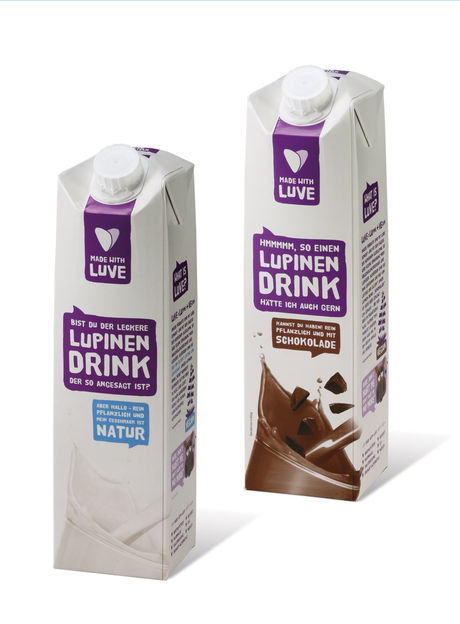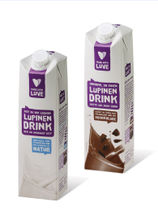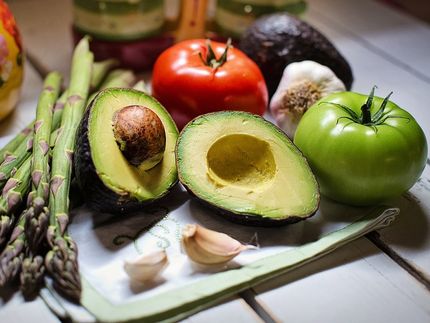Lupin drinks in carton packs from SIG Combibloc: CO2 bonus for product and packaging
Protein from sweet lupins as a GMO-free alternative to soybeans
Advertisement
With their white-flowering umbels, not only are Sweet Blue Lupins pretty to look at, but right now they are also attracting the interest of the food industry. Researchers from the Fraunhofer Institute for process engineering and Packaging (IVV) in Freising, Germany, and Prolupin have found a way to produce the unique, purely herbal lupin protein isolate (LPI), which is similar to animal proteins, from lupin seeds. The researchers received the Deutsche Zukunftspreis 2014 (the Federal President’s award for technology and innovation) for this innovative process. On the European market, the high protein content of lupins could make the plant a climate-friendly and GMO-free alternative to soy beans imported from Asia and South America. In Germany, the first lupin drinks are now available in aseptic carton packs from SIG Combibloc, under the umbrella brand MADE WITH LUVE.

The Sweet Blue Lupin (Lupinus angustifolius), here the Boregine variety, is cultivated in Mecklenburg-Western Pomerania – regionally and without genetic engineering. It provides the raw material for all MADE WITH LUVE products.
Ansgar Pudenz

With the ‘MADE WITH LUVE’ product range (LUVE is an abbreviation for LUpins and VEgan), Prolupin is targeting not just vegans, but all health-conscious consumers. The product range includes lupin drinks, ice cream, desserts, yoghurt alternatives, pasta, spreads and mayonnaise.
SIG Combibloc


In ancient Egypt, Greece and South America, lupin seeds were considered a high-value staple food. However, because of the bitter compounds they contain, people lost interest in them. Through careful breeding, in the early 20th century the Sweet Blue Lupin with much lower alkaloid content was developed. With between 36 and 48 per cent protein content, lupin seeds are extremely high in protein, and in material composition they are similar to soybeans. Lupin seeds contain all the essential amino acids – including lysine. That makes lupin protein particularly high-quality. The fat content of lupins is four to seven per cent – so sweet lupins are much lower in fat and have less allergy potential than soybeans. In addition, lupins are free from starch, cholesterol and gluten, and they are a good source of minerals and trace elements.
Malte Stampe, managing director of Prolupin GmbH: “The seeds of the native Sweet Blue Lupin are the raw material for the protein, which we extract using a patented and very gentle process developed by the Fraunhofer IVV. In foods, milk, meat and egg can be replaced with the protein – making lupins of interest for vegetarians, vegans and anyone else who wants to eat a healthy, varied diet that is also climate-friendly. Lupins flourish particularly well in sandy soils such as those found in northern and central Europe – they can therefore be grown on the soils here, and also harvested and processed here. Lupins thus have a CO2 bonus compared to soybeans. We don’t need to fly the lupins halfway round the world, thus avoiding the CO2 emissions generated by long transport routes. And lupins are even good for the soil, enriching it with nitrogen”.
CO2 bonus for product and packaging
With the ‘MADE WITH LUVE’ product range (LUVE is an abbreviation for LUpins and VEgan), Prolupin is targeting not just vegans, but all health-conscious consumers. The product range includes lupin drinks, ice cream, desserts, yoghurt alternatives, pasta, spreads and mayonnaise. Malte Stampe: “We decided to bring out our lupin drinks in carton packs. The carton packs from SIG Combibloc safeguard the quality of the beverages, and are gentle on the environment – just like our lupin products. Carton packs are composed on average up to 75 per cent of wood, a renewable resource. That means they use much less fossil resources, such as oil, than products like PET bottles. In addition, while they’re growing, trees absorb CO2 and give off oxygen. So sustainably managed forests help protect the climate. For this reason, we think lupin drinks and carton packs fit together very well, and consumers find them easier to handle than competing products”.






























































